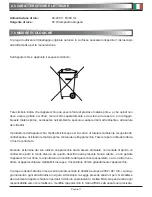
Page 6
4.1
Adjust the observation head
Loosen the lock-screw, turn the observation head to a comfortable position for observation,
and then lock the lock-screw.
4.2
Place the specimen on the stage
Lock the specimen slide on the mechanical stage using the slide clamp. Ensure that the spe-
cimen is centred over the stage opening by adjusting the coaxial knobs of the stage.
4.3
Lamp settings
The microscope is fitted with a 50 W illuminator. Insert the plug of the cable into the power
socket and turn on the switch on the back of the main body. Turn the brightness adjustment
knob to a brightness suitable for observation. The lamp can be centred using the two lamp-
centring screws on the back of the microscope. The diffuser filter can be inserted using the
selector on the right side of the microscope body.
4.4
Adjust interpupillary distance
Hold the right and left parts of the observation head by both hands and adjust the interpu-
pillary distance by turning the two parts until one circle of light can be seen. After finishing
the interpupillary adjustment, turn the dioptric adjustment ring on the left eye tube to the “0”
position at the graduation line on the eyetube.
4.5
Focus and diopter adjustment
Loosen the focus-stop knob, rotate the coarse focusing knob to bring the slide into focus
with an objective with a low magnification, and then lock the focus-stop knob. Adjust the fine
focusing knob to get the image sharp and clear while observing with your right eye, then turn
the left dioptric adjustment ring to a sharp and clear image also with the other eye. Turn the
tension-adjust-knob to get a suitable tension for the focus system. When the image is in fo-
cus, turn the nosepiece to choose the objective you need.
4.6
Condenser adjustment
Turn the condenser adjustment knob to move the condenser up or down for a clear and
uniform sample illumination. The two condenser centring screws can be used to centre the
condenser.
4.7
Set the numerical aperture
Adjust the aperture of the iris diaphragm to set the numerical aperture of the illuminator, thus
controlling image contrast and resolution.
4.8
Field diaphragm
Adjust the field diaphragm to align the system and to control stray light.
4.9
Additional filters
The chromatic correction filter (blue) and the monochromator filter (green) can be inserted for
definition of specimen parts. The use of the green filter is recommended for phase contrast
observations.
4.10
Using the polarizer (optional)
The polarizing set consists of two filters; the analyser and the polarizer. The analyser is pla-
ced in the analyser holder and the polarizer on top of the illuminator.
4.0 USING THE MICROSCOPE
Summary of Contents for B-600
Page 34: ......







































